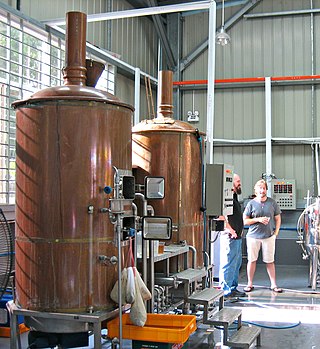
Beer is one of the oldest alcoholic drinks in the world, the most widely consumed, and the third most popular drink after water and tea. Beer is produced by the brewing and fermentation of starches from cereal grains—most commonly malted barley, although wheat, maize (corn), rice, and oats are also used. The fermentation of the starch sugars in the wort produces ethanol and carbonation in the beer. Most modern beer is brewed with hops, which add bitterness and other flavours and act as a natural preservative and stabilising agent. Other flavouring agents, such as gruit, herbs, or fruits, may be included or used instead of hops. In commercial brewing, natural carbonation is often replaced with forced carbonation.

Heineken N.V. is a Dutch multinational brewing company, founded in 1864 by Gerard Adriaan Heineken in Amsterdam. As of 2019, Heineken owns over 165 breweries in more than 70 countries. It produces 348 international, regional, local and speciality beers and ciders and employs approximately 85,000 people.

John Smith's Brewery in Tadcaster, North Yorkshire, England, produces beers including John Smith's, the highest selling bitter in the United Kingdom since the mid-1990s.

The Coors Brewing Company is an American brewery and beer company based in Golden, Colorado that was founded in 1873. In 2005, Adolph Coors Company, the holding company that owned Coors Brewing, merged with Molson, Inc. to become Molson Coors. The first Coors brewery location in Golden, Colorado is the largest single brewing facility operating in the world.

Craft beer is a beer that has been made by craft breweries, which typically produce smaller amounts of beer, than larger "macro" breweries, and are often independently owned. Such breweries are generally perceived and marketed as emphasising enthusiasm, new flavours, and varied brewing techniques.

The U.S. state of Oregon is home to more than 200 breweries and brew pubs that produce a large variety of beer.

Joseph Schlitz Brewing Company is an American brewery based in Milwaukee, Wisconsin, and was once the largest producer of beer in the United States. Its namesake beer, Schlitz, was known as "The beer that made Milwaukee famous" and was advertised with the slogan "When you're out of Schlitz, you're out of beer". Schlitz first became the largest beer producer in the US in 1902 and enjoyed that status at several points during the first half of the 20th century, exchanging the title with Anheuser-Busch multiple times during the 1950s.

Beer was introduced to Canada by European settlers in the seventeenth century. The first commercial brewery was La Brasseries du Roy started by New France Intendant Jean Talon, in Québec City in 1668. Many commercial brewers thrived until prohibition in Canada. The provincial and federal governments' attempt to eliminate "intoxicating" beverages led to the closing of nearly three quarters of breweries between 1878 and 1928. It was only in the second half of the twentieth century that a significant number of new breweries opened up. The Canadian beer industry now plays an important role in Canadian identity, although globalization of the brewing industry has seen the major players in Canada acquired by or merged with foreign companies, notably its three largest beer producers: Labatt, Molson and Sleeman. The result is that Moosehead, with an estimated 3.8 percent share of the domestic market in 2016, has become the largest fully Canadian-owned brewer.

Beer in Japan mostly comes from the country's four major breweries, Asahi, Kirin, Sapporo and Suntory, which mainly produce pale lagers around 5% ABV. Beer is immensely popular, far ahead of sake consumption.

Beer in Israel is manufactured primarily by two major breweries – Tempo Beer Industries and Israel Beer Breweries. Over the past decade numerous microbreweries have established themselves throughout the country. Beer festivals are held annually in Israel, of which one of the largest is in Jerusalem.
Quebec beer is the beer brewed in Quebec, Canada, often with ingredients from Quebec itself and generally following the recipes of the French, Belgian and British brewing traditions. Generally, the beers brewed in Quebec differ from those in the rest of North America because of the relative importance of the French and Belgian traditions alongside that of Great Britain. German-type beers are also produced by some breweries.

The beers of the Caribbean are unique to each island in the region, although many are variants of the same style. Each island generally brews its own unique pale lager, the occasional stout, and often a non-alcoholic malta beverage. Contract-brewing of international beers is also common, with Heineken Pilsener and Guinness Foreign Extra Stout being the most popular. The beers vary between the islands to suit the taste and the brewing method used.

A brewery or brewing company is a business that makes and sells beer. The place at which beer is commercially made is either called a brewery or a beerhouse, where distinct sets of brewing equipment are called plant. The commercial brewing of beer has taken place since at least 2500 BC; in ancient Mesopotamia, brewers derived social sanction and divine protection from the goddess Ninkasi. Brewing was initially a cottage industry, with production taking place at home; by the ninth century, monasteries and farms would produce beer on a larger scale, selling the excess; and by the eleventh and twelfth centuries larger, dedicated breweries with eight to ten workers were being built.
The production of beer in New Jersey has been in a state of recovery since Prohibition (1919-1933) and the Great Depression (1929-1945). Currently, the state has 123 licensed breweries: a large production brewery owned by an international beverage company, Anheuser-Busch InBev, and 122 independent microbreweries and 19 brewpubs. The growth of the microbreweries and brewpubs since the 1990s has been aided by the loosening of the state's licensing restrictions and strict alcohol control laws, many of which were a legacy of Prohibition.

Vietnam has an established beer culture that emerged during French colonisation. Beer in Vietnamese is bia, calqued from French bière. Some beer brands or beer types that are popular in Vietnam include Bia Saigon, Bia Hanoi, bia hơi, Heineken beer, and Tiger Beer.












